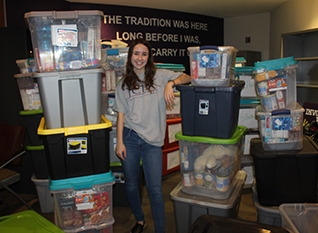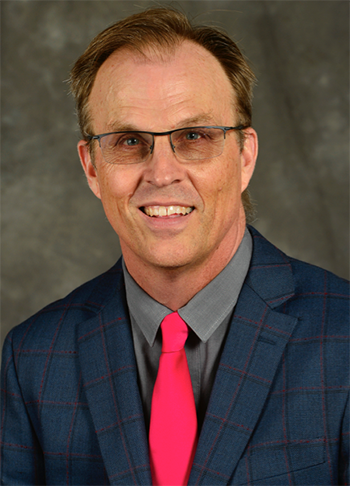SFA University
October 23, 2020 - The Stephen F. Austin State University School of Theatre will present the student-directed one-act play “The Bald Soprano” at 7:30pm Friday, Oct. 30, and at 2pm and 7:30pm Saturday, Oct.31, in Regents Suite A in the Baker Pattillo Student Center on the SFA campus.The show will also be livestreamed.
Directed by Sulphur Springs senior Kaitlyn McDearmont, “The Bald Soprano” is an absurdist play written by Eugène Ionesco. The story line follows a proper English couple, the Smiths, who are sharing an evening with the Martins. The play was inspired by Ionesco’s attempt to learn English, and the dialogue is a parody of the kinds of conversations and take place in foreign-language instruction. The couples, eventually joined by the Fire Chiefand his lover, who is also the Smiths’ maid, tell stories about their lives.
The cast includes San Antonio freshman Hannah Marfin as Mrs.Smith; Ferris senior Cameron Ralston as Mr. Smith; Mount Enterprise sophomore Mikayla Whitlow as Mary; Houston junior Johana Lenington as Mrs. Martin; Center sophomore Keaton Watlington as Mr. Martin; and Red Oak senior Sedona McDonaldas Fire Chief.
Stage manager is Valeria De La Cruz, Zacatecas, Mexico,senior; scenic designer is Jenna Alley, Kingwood junior; costume designer isCairo Pratt, Scurry junior; lighting designer is CaitLyne Martin, Brownsborojunior; and sound designer is Carson Cook, McKinney junior.
McDearmont is a theatre education major. As an SFA student,she lists her favorite shows with which she has been affiliated as “The Wolves,” in which she acted as assistant director; “Dancing at Lughnasa,” for which she was props master; and “Crimes of the Heart,” in which she acted in the role of Babe.
Faculty production advisor for “The Bald Soprano” is Rick Jones.
Tickets are $4. To purchase tickets or virtual access, visit the SFA Fine Arts Box Office online at boxoffice.sfasu.edu or call(936) 468-6407. Box office sales end at 4pm on Oct. 30. For more information about the play, call the School of Theatre at (936) 468-4003 or visit theatre.sfasu.edu.
October 20, 2020 - The Stephen F. Austin State University Office of Multicultural Affairs is hosting “Where We Stand: A Celebration of Native American Heritage” from noon to 1 p.m. Nov. 10 at the Baker Pattillo Student Center Multimedia Room.
The event is free and open to the public, but due to COVID-19 guidelines, only a limited number of people will be allowed to attend in person. Others can participate virtually on Zoom or Instagram Live via OMA’s Instagram page, @omasfa1991.
“This celebration aims to raise awareness about indigenous cultures and their struggles while highlighting actions that students, faculty and community members can take to ensure that the indigenous community is being respected, supported and protected,” said Andrea Flores, OMA student ambassador.
The event features information about tribal communities at the national and local levels.
“We will explore topics related to the foundation of our country, the societal understanding of Native Americans and the tribes local to East Texas,” said Jasmine Hassan, OMA student assistant. “Through our interactive and educational activities, attendees will take away valuable information that we hope will create a positive climate in our community.”
Native American Heritage Month gives American indigenous people the opportunity to express their concerns and find solutions for building bridges of understanding and friendship in their local areas. The celebration also recognizes the significant contributions the first Americans made to establish and grow the United States. Former U.S. President George H. W. Bush established the commemorative month in 1990.
To register to attend in person or via Zoom, visit sfasu.edu/oma.
October 19, 2020 - Members of Stephen F. Austin State University’s Jacks Council on Family Relations (JCFR) are gearing up for their annual food drive, Thanksgiving Homebound.
Recognized last year by the National Council on Family Relations as a model student-run project, Thanksgiving Homebound has helped more than 100 local families every year since 2011.
“Last year, with the support of SFA organizations and community members, we were able to provide Thanksgiving meals to 150 families in the Nacogdoches community,” said Lindsey Lightfoot, JCFR president. “With COVID-19, we know families in our community are more in need than ever.”
JCFR asks campus organizations, departments, faculty and staff, students and Nacogdoches community members to donate food items families can use to prepare a Thanksgiving meal along with gift items for family members.
“The Thanksgiving Homebound program is a great opportunity to connect with the community and ensure an underprivileged family will have a wonderful Thanksgiving dinner,” Lightfoot said.
Those interested in participating should contact JCFR at sfasujcfr@gmail.com to adopt a family. The group will provide a shopping list and general description of the family to help participants purchase food items and gifts.
After collecting the items in an appropriately sized container, participants need to deliver them to JCFR between 11 a.m. and 5 p.m. Nov. 9 and 10 and between 11 a.m. and 7 p.m. Nov. 11 in the Baker Pattillo Student Center, Room 1.204.
Donated items will be distributed to families through The East Texas Family Crisis Center, Solid Foundation and GETCAP Head Start.
For more information, contact JCFR at sfasujcfr@gmail.com.

Lindsey Lightfoot, president of Stephen F. Austin State University’s Jacks Council on Family Relations, helps sort the food and gift items donated for 150 local families during Thanksgiving Homebound in 2019. “With COVID-19, we know families in our community are more in need than ever,” Lightfoot said.
October 19, 2020 Nacogdoches – The Stephen F. Austin State University Office of Multicultural Affairs and Lumberjack Cultural Association are virtually hosting the Tunnel of Oppression from 6 to 9pm November 2 and 3 on Zoom.
“The Tunnel of Oppression is an enlightening and eye-opening experience that gives individuals who attend an insight on current topics that are affecting the world that they may be unaware of,” said Breanna Moore, LCA president.
The annual interactive museum spotlights different forms of oppression through theatre and multimedia presentations. In the past, the event has shed light on issues such as human trafficking, genocide, racial profiling and suicide.
“I want attendees to learn about different events and social topics and acknowledge the different forms of oppression that do not affect them directly,” Moore said.
The event is free and open to the public. However, due to the seriousness of the topics, children younger than 13 should attend with a parent or guardian.
To register for the event, visit sfasu.edu/oma. For more information, contact the Office of Multicultural Affairs at (936) 468-1073 or oma@sfasu.edu.
October 12, 2020 - With schools moving education online across the world, Stephen F. Austin State University understands access to high-speed internet is more critical than ever and is inviting area K-12 students to use campus Wi-Fi and computer labs.
“The need for online learning due to COVID-19 has made high-speed internet a requirement for so many students,” said Tim Lewallen, assistant director for customer service in SFA’s Information Technology Services. “We recognize that many in the community do not have high-speed internet available where they live, so our intent is for this initiative to aid those students. We recognize the value of an education and want to assist local students in any way possible.”
For years, SFA has offered Wi-Fi access to the public through a campus sponsorship program. Previously, a faculty or staff member was required to sponsor an individual’s account. The sponsorship requirement has since been removed.
“While we currently have instructions for campus visitors to connect to the SFA-Guest network, we will be producing instructions that are specific to K-12 students and their guardians,” Lewallen said. “Guest wireless services are available all over campus, but it would be best for our visitors to limit themselves to the Baker Pattillo Student Center and Steen Library.”
Though not part of it, the offering is in line with an initiative by Nacogdoches Independent School District called Dragon Connect, where locations across the city are placing signs to signal that students may use the location’s Wi-Fi. However, Lewallen specified that any Nacogdoches County student may connect to SFA’s Wi-Fi.
“All students are welcome to come to our campus and use it, regardless of where they are enrolled,” he added.
Unlike some of the other local Wi-Fi locations, SFA is in a particularly unique position to offer internet access in a setting already geared toward education. Rather than sitting in cars or on park benches, students have access to “special academic spaces with furniture and technology specifically geared toward optimal study environments,” Lewallen said.
In addition to Wi-Fi access, a select number of campus computers in the Library Information Network Center, or LINC lab, are available to students in need.
“We also have public-use computers in our Steen Library LINC lab that are available to local area K-12 students,” Lewallen said. “Guests to campus who have issues or questions should visit the LINC computer lab’s help desk on the first floor of Steen Library.”
Visitors to campus must follow COVID-19 guidelines, which include wearing a mask in all indoor spaces as well as maintaining a safe social distance from others. An adult must accompany any child under the age of 13 while in the library.
For more information on connecting to SFA’s Wi-Fi, visit help.sfasu.edu.
October 9, 2020 - A new tuition funding opportunity as well as modernized application requirements are just two of several reasons officials believe Stephen F. Austin State University graduate enrollment increased by more than 10% this fall, despite bleak educational forecasts based on the impacts of the COVID-19 pandemic.
A third major contributing factor was the transition of hundreds of courses to distance formats as the university sought to evolve its fall semester to meet physical-distancing challenges.
“Collaboration between the Office of Research and Graduate Studies staff members and program coordinators in all six colleges has led to truly innovative initiatives aimed at program enhancement and meeting students’ unique circumstances,” said Dr. Pauline M. Sampson, dean of SFA’s research and graduate studies. “Our office has worked very hard on recruitment strategies, and we see that students understand the many benefits of graduate-level educational pursuits at any time, but especially during an economic downturn.”
Flexible learning
SFA’s College of Liberal and Applied Arts experienced the largest enrollment increase at 22.1%. The college’s Department of Mass Communication and School of Social Work comprised the two biggest portions of this growth.
“Since our Master of Art in mass communication is 100% online and was even prior to the pandemic, it meets students where they are,” said Dr. John Allen Hendricks, chair and professor in the Department of Mass Communication. “The online aspect is very attractive to working professionals who want to pursue an advanced degree at their own rhythm as well as work from the safety of their homes during the pandemic.”
School of Social Work officials echoed the contributions of flexible learning on enrollment.
“Virtual learning has offered students flexibility in juggling family and job responsibilities with career opportunities,” said Dr. Freddie Avant, School of Social Work director and associate dean in the College of Liberal and Applied Arts. “Also, the reputation of our faculty, staff and internship programs create unique experiences that prepare students for their career journey.”
The College of Fine Arts experienced the second largest graduate enrollment increase at 19.7%, with the School of Music comprising the largest portion of growth.
“We have several fully online graduate degrees that have become very attractive thanks to the dedication and hard work of faculty members who oversee them,” said Dr. Gary Wurtz, director of the School of Music. “Our online Master of Music in theory/composition, in particular, has gotten to the point where there are more applicants than we can accept. Our success is entirely attributable to the quality and dedication of our faculty.”
SFA’s James I. Perkins College of Education comprises the largest graduate enrollment of the university’s six colleges at 874 students for fall 2020, which is an increase from 808 in fall 2019.
Creation of LEAP
University administrators also attribute a portion of the increase to the creation of the Lumberjack Education Assistance Program, which SFA’s Board of Regents approved in April.
For SFA employees, their spouses and dependents, the LEAP program exempts mandatory tuition and fees except statutory tuition, which is $50 per semester credit hours for undergraduate classes or $80 for graduate-level courses. Employees who enroll in classes receive scholarship support to cover the statutory tuition costs, and there is no cap on the number of courses eligible participants may take with the LEAP benefit.
LEAP replaced SFA’s previous employee scholarship program, which offered a maximum of $3,000 per academic year.
“We have 259 graduate students taking advantage of the LEAP program this fall. Of those, 131 are teaching or research assistants and 65 are first-time enrollees in graduate programs at SFA,” Sampson said. “We also had 128 faculty and staff take advantage of LEAP for graduate courses.”
Modernizing application processes
In addition to LEAP funding and the perks of virtual learning, key changes to application requirements have modernized the application process, making it easier for students to apply to SFA’s graduate school while retaining the university’s high academic standard.
Significant changes include only requiring applicants to submit their bachelor’s degree transcript rather than transcripts from all previous institutions and removing the requirement for GRE submission in several programs.
“Many universities, including Ivy League institutions, have removed the GRE requirement because it tends to restrict access to graduate study,” Sampson explained. “There is a substantial cost not only to take the GRE, but also to access study resources, take the GRE multiple times if a higher score is desired, purchase tutor materials or hire tutors. For many prospective students, these are undue burdens.”
Research and graduate studies officials also opted to extend a graduate application’s active period to one calendar year. This reduces application costs for prospective students who may apply then experience a life change that sets their enrollment back by a semester.
“All of these changes allow us to recruit a more diverse graduate student body while reducing obstacles to potential students,” Sampson said. “We want our academic programs to be rigorous, but we want access to those programs to meet the unique circumstances each future Lumberjack faces.”
SFA’s graduate programs each have unique deadlines and application requirements. Information for each program can be found on the ORGS website at sfasu.edu/graduate by selecting “Areas of Study” under the Graduate Admissions tab.
By Christine Broussard, marketing communications coordinator at Stephen F. Austin State University
October 9, 2020 - The Stanley Center for Speech and Language Disorders at Stephen F. Austin State University has received a 2020 Speak Out and Loud Crowd grant from the Parkinson Voice Project, the only 501(c)(3) nonprofit organization in the world dedicated to helping individuals with Parkinson’s disease improve their speech and swallowing.
The SFA clinic is one of only 248 hospitals, university speech therapy clinics, private practices and nonprofit organizations worldwide to receive this funding. The grant provides free Speak Out training for the clinical instructors and graduate students in SFA’s speech-language pathology program. It also funds materials that are used in the Speak Out and Loud Crowd programs.
“Up to 90% of people with Parkinson’s are at high risk of losing their ability to speak, and aspiration pneumonia caused by swallowing issues accounts for 70% of the mortality rate in this patient population,” said Parkinson Voice Project Founder and CEO Samantha Elandary. “Awarding these grants substantially increases access to quality speech treatment to those living with Parkinson’s.”
East Texas has a large population of people diagnosed with Parkinson’s disease, according to Deena Petersen, clinic director.
“We are fortunate to be trained in the Speak Out program to help these clients communicate better,” she said.
The clinic offers free therapy sessions to East Texans with Parkinson’s disease to help them learn how to speak with intent, Petersen said.
“People with Parkinson’s disease do not realize they are speaking softly and people cannot hear them. In the Speak Out program, clients become more aware of their speech and learn that when they speak, it must be with intention.”
In addition to individual Speak Out sessions, the Stanley Center for Speech and Language Disorders offers the Loud Crowd program, which is a maintenance program for patients with Parkinson’s disease offering ongoing vocal practice, accountability, support and encouragement. When clients complete the Speak Out program, they transition to Loud Crowd.
The Parkinson Voice Project’s grant program honors Dr. Daniel R. Boone, a world-renowned speech-language pathologist and voice expert who recognized in the late 1950s that individuals with Parkinson’s disease could improve their communication if they spoke with intent.
For more information on the clinic’s services, call (936) 468-7109.
Second eight-week semester begins Oct. 15
October 7, 2020 - After transitioning a considerable portion of courses to distance formats as a result of the pandemic, Stephen F. Austin State University has multiplied its fall course section options significantly, announcing that it will be offering 201 course sections during its second eight-week fall semester.
This increase means students interested in enrolling in the second half of fall have dozens of courses from which to build an ideal schedule.
The second eight-week fall semester begins Oct. 15; however, students may register online through Oct. 19.
Students also may continue to register Oct. 20 through 22 by filling out a special permit form. A link to the form is located in mySFA by clicking “Registration Request Form” in the “Register” box under the “Registration” tab. Directions for submitting the form are included in the link.
“We have had an amazing response to our new eight-week semester options and are thrilled we are able to offer so many more courses during the fall’s second half,” said Dr. Steve Bullard, provost and vice president for academic affairs. “The eight-week option, coupled with added course sections, means Lumberjacks have more flexibility to build a schedule that works for them — and potentially finish college in less time!”
For more information on fall registration, visit sfasu.edu/registrar/687.asp. If you’re not currently a student, apply to SFA today at ApplyTexas.org.
October 6, 2020 - The Stanley Center for Speech and Language Disorders at Stephen F. Austin State University is now providing in-person as well as teletherapy appointments for clients of all ages.
Services include evaluation and treatment of individuals who have difficulty communicating due to articulation, voice, fluency, language or cognitive impairments (for example, post-stroke issues or traumatic brain injury) or who have issues with swallowing.
Speech and language evaluations are $75, and speech therapy sessions are $15 per session. The clinic also offers student and employee rates as well as sliding-scale rates based on annual income.
In addition, the clinic provides speech therapy to those with Parkinson’s disease at no charge via face-to-face and teletherapy sessions.
As the pandemic continues, clinic staff members are following COVID-19 guidelines recommended by the Centers for Disease Control and Prevention, according to Deena Petersen, clinic director.
“We’re wearing face shields, using plexiglass barriers, sanitizing frequently and screening all clients before they enter the clinic,” she said.
Students in SFA’s graduate speech-language pathology program conduct all evaluation and treatment sessions while being supervised by a licensed speech-language pathologist, according to Petersen.
For more information, call (936) 468-7109.
September 29, 2020 - While many people consider math a subject that transcends languages, math students still need to solve word problems and justify their answers. Thus, their teachers need to develop language as well as teach math concepts.
To help teachers do just that, Dr. Jim Ewing, associate professor in the Department of Education Studies at Stephen F. Austin State University, has self-published two new books on English-language learners. Both build on his highly regarded primer, “Math for ELLs: As Easy as Uno, Dos, Tres.”
Ewing released the primer in February to help teachers who work with the three quarters of ELLs who speak Spanish at home. The book describes developing a positive math mindset in ELLs, providing access to content and engaging them in productive struggle, among other topics.
Choice magazine called the book “invaluable to both pre-service and in-service teachers, as well as those studying bilingual education and English for speakers of other languages.”
Building on “Math for ELLs,” Ewing recently released two more books that apply the theories from his first to help teachers working with ELLs during the COVID-19 pandemic.
“Math for Hispanic ELs: A Teacher's Guide for the Classroom and Distance Learning (K-2)” features lesson plans and word problems for students in kindergarten through second grade, while “Math for Hispanic ELs: A Teacher's Guide for the Classroom and Distance Learning (3 to 5)” focuses on students in third through fifth grade.
“I guide the teachers in meeting the math needs of emergent bilingual students in the classroom, online and without Wi-Fi,” Ewing said. “I specifically focus on Latinx students.”
All three books are available on amazon.com.
For more information, email Ewing at ewingjs@sfasu.edu.

Dr. Jim Ewing, associate professor in the Department of Education Studies at Stephen F. Austin State University, has published two new books that “guide teachers in meeting the math needs of emergent bilingual students in the classroom, online and without Wi-Fi.”
By Jo Gilmore, marketing communications specialist at Stephen F. Austin State University.








